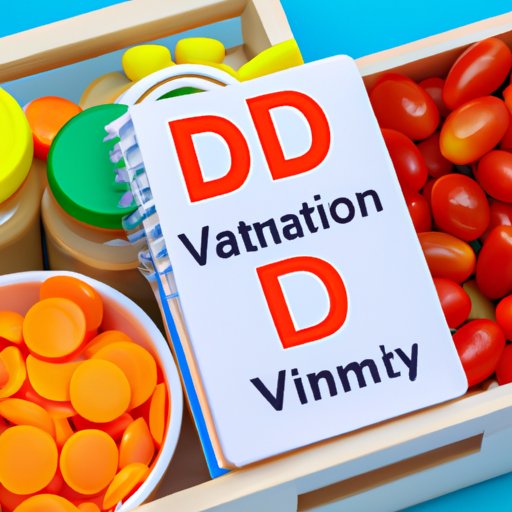
I. Introduction
Vitamin D is a crucial nutrient for maintaining a healthy body. It helps your body absorb calcium, which is essential for building strong bones and teeth. Vitamin D also plays a role in supporting a healthy immune system and can even help regulate mood. But, like with any nutrient, it’s possible to consume too much of it. In this article, we’ll explore the symptoms of vitamin D overdose, the importance of proper dosage, health risks associated with excess vitamin D intake, food sources of vitamin D, and how to test and monitor your vitamin D levels.
II. Discussion of Vitamin D Overdose Symptoms
Having too much vitamin D in your system can be toxic and can lead to unpleasant symptoms. Symptoms of vitamin D overdose can include nausea, vomiting, constipation, muscle weakness, and confusion. Excessive vitamin D intake can also result in an increased risk of heart disease, kidney stones, and damage to blood vessels.
When there is too much vitamin D in your system, your body absorbs too much calcium. The excess calcium can then cause the symptoms associated with vitamin D overdose.
III. The Importance of Vitamin D Dosage
It’s important to follow the recommended dosage for vitamin D. The recommended amount of vitamin D varies depending on factors such as age and health status. For most adults, the recommended daily dosage is around 600-800 IU. However, some people may require more or less vitamin D.
Taking excessive amounts of vitamin D can have adverse health effects, including damage to organs such as the kidneys and heart. Vitamin D overdoses are particularly dangerous for infants, who may develop high levels of calcium in their blood, leading to seizures and other health complications.
IV. Health Risks of Excess Vitamin D
An excess of vitamin D intake can cause a variety of health complications. One of the most common risks is an increased risk of kidney stones. This is because the excessive calcium in your system can solidify and accumulate in your kidneys, leading to the formation of painful stones.
Another risk of excessive vitamin D intake is damage to your blood vessels. When too much calcium accumulates in your system, it can cause your arteries to harden and your blood pressure to rise, increasing your risk of heart disease.
Additionally, too much vitamin D can cause a buildup of calcium in your blood, a condition called hypercalcemia. This can cause symptoms such as frequent urination, excessive thirst, and confusion.
V. Food Sources of Vitamin D
The most natural source of vitamin D is exposure to sunlight. When exposed to sunlight, your skin produces vitamin D. However, spending too much time in the sun can lead to skin damage and an increased risk of skin cancer. Therefore, it’s important to also get your vitamin D from food sources.
Foods that are high in vitamin D include fatty fish, such as salmon and tuna, egg yolks, and cheese. Many foods, including milk, breakfast cereals, and yogurt, are also fortified with vitamin D.
It’s important to remember that vitamin D is just one of many essential nutrients in your diet. A balanced diet that includes a variety of fruits, vegetables, and lean proteins is key to maintaining good health.

VI. Vitamin D Testing and Monitoring
If you’re concerned about your vitamin D intake or if you have symptoms of vitamin D overdose, it’s important to talk to your doctor. They may recommend testing your vitamin D levels to see if you’re deficient or if you have excessive levels of vitamin D.
The frequency of vitamin D testing depends on factors such as age and health status. If you’re at risk for vitamin D deficiency, your doctor may recommend testing your levels more frequently.
Understanding your vitamin D test results can be confusing. A normal vitamin D level is around 30-100 ng/ml. Levels lower than 20 ng/ml indicate a deficiency, while levels above 100 ng/ml can indicate toxicity.
VII. Finding the Right Vitamin D Supplement
If you’re not getting enough vitamin D through your diet or sunlight exposure, you may need to take a vitamin D supplement. There are several types of vitamin D supplements available, including vitamin D2 and vitamin D3.
The amount of vitamin D you should take depends on factors such as age and health status. It’s important to follow the recommended dosage, as overdosing on vitamin D can have serious health consequences.
When choosing a vitamin D supplement, look for a product with a USP (United States Pharmacopeia) verification mark. This indicates that the supplement contains the amount of vitamin D advertised on the label.
VIII. Conclusion
While vitamin D is an essential nutrient for maintaining good health, it’s important to be mindful of your intake. Consuming too much vitamin D can have serious health consequences, including kidney stones, blood vessel damage, and hypercalcemia. It’s important to get vitamin D from natural sources such as sunlight and a balanced diet that includes foods high in vitamin D. If you’re concerned about your vitamin D levels or if you’re experiencing symptoms of vitamin D overdose, talk to your doctor.
Remember, it’s all about balance. By practicing good vitamin D habits, you can maintain a healthy body and avoid the risks associated with excessive intake.





